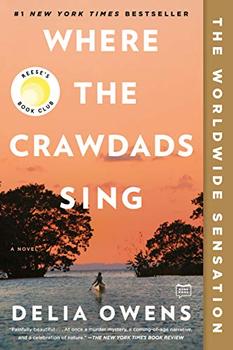Summary | Excerpt | Reading Guide | Reviews | Beyond the Book | Readalikes | Genres & Themes | Author Bio

1.
Ma
1952
The morning burned so August-hot, the marsh's moist breath hung the oaks and pines with fog. The palmetto patches stood unusually quiet except for the low, slow flap of the heron's wings lifting from the lagoon. And then, Kya, only six at the time, heard the screen door slap. Standing on the stool, she stopped scrubbing grits from the pot and lowered it into the basin of worn-out suds. No sounds now but her own breathing. Who had left the shack? Not Ma. She never let the door slam.
But when Kya ran to the porch, she saw her mother in a long brown skirt, kick pleats nipping at her ankles, as she walked down the sandy lane in high heels. The stubby-nosed shoes were fake alligator skin. Her only going-out pair. Kya wanted to holler out but knew not to rouse Pa, so opened the door and stood on the brick-'n'-board steps. From there she saw the blue train case Ma carried. Usually, with the confidence of a pup, Kya knew her mother would return with meat wrapped in greasy brown paper or with a chicken, head dangling down. But she never wore the gator heels, never took a case.
Ma always looked back where the foot lane met the road, one arm held high, white palm waving, as she turned onto the track, which wove through bog forests, cattail lagoons, and maybe-if the tide obliged-eventually into town. But today she walked on, unsteady in the ruts. Her tall figure emerged now and then through the holes of the forest until only swatches of white scarf flashed between the leaves. Kya sprinted to the spot she knew would bare the road; surely Ma would wave from there, but she arrived only in time to glimpse the blue case-the color so wrong for the woods--as it disappeared. A heaviness, thick as black-cotton mud, pushed her chest as she returned to the steps to wait.
Kya was the youngest of five, the others much older, though later she couldn't recall their ages. They lived with Ma and Pa, squeezed together like penned rabbits, in the rough-cut shack, its screened porch staring big-eyed from under the oaks.
Jodie, the brother closest to Kya, but still seven years older, stepped from the house and stood behind her. He had her same dark eyes and black hair; had taught her birdsongs, star names, how to steer the boat through saw grass.
"Ma'll be back," he said.
"I dunno. She's wearin' her gator shoes."
"A ma don't leave her kids. It ain't in 'em."
"You told me that fox left her babies."
"Yeah, but that vixen got 'er leg all tore up. She'd've starved to death if she'd tried to feed herself 'n' her kits. She was better off to leave 'em, heal herself up, then whelp more when she could raise 'em good. Ma ain't starvin', she'll be back." Jodie wasn't nearly as sure as he sounded, but said it for Kya.
Her throat tight, she whispered, "But Ma's carryin' that blue case like she's goin' somewheres big."
The shack sat back from the palmettos, which sprawled across sand flats to a necklace of green lagoons and, in the distance, all the marsh beyond. Miles of blade-grass so tough it grew in salt water, interrupted only by trees so bent they wore the shape of the wind. Oak forests bunched around the other sides of the shack and sheltered the closest lagoon, its surface so rich in life it churned. Salt air and gull-song drifted through the trees from the sea.
Claiming territory hadn't changed much since the 1500s. The scattered marsh holdings weren't legally described, just staked out natural-a creek boundary here, a dead oak there-by renegades. A man doesn't set up a palmetto lean-to in a bog unless he's on the run from somebody or at the end of his own road.
The marsh was guarded by a torn shoreline, labeled by early explorers as the "Graveyard of the Atlantic" because riptides, furious winds, and shallow shoals wrecked ships like paper hats along what would become the North Carolina coast. One seaman's journal read, "rang'd along the Shoar ... but could discern no Entrance ... A violent Storm overtook us ... we were forced to get off to Sea, to secure Ourselves and Ship, and were driven by the Rapidity of a strong Current ...
Excerpted from Where the Crawdads Sing by Delia Owens. All rights reserved. No part of this excerpt may be reproduced or reprinted without permission in writing from the publisher.
Your guide toexceptional books
BookBrowse seeks out and recommends the best in contemporary fiction and nonfiction—books that not only engage and entertain but also deepen our understanding of ourselves and the world around us.